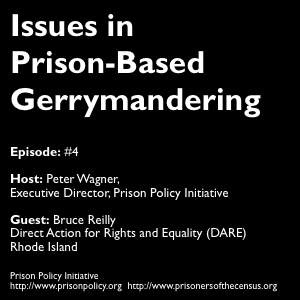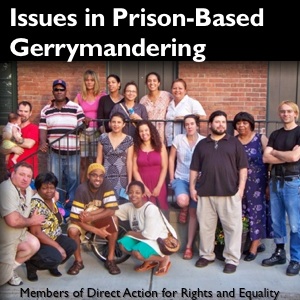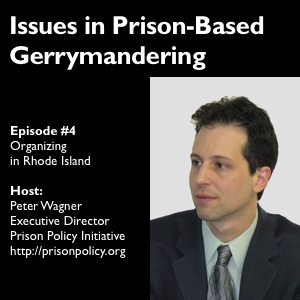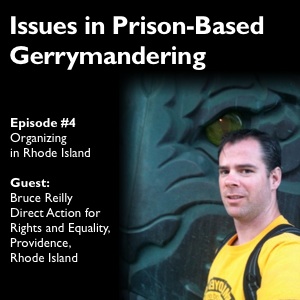“Organizing to end prison-based gerrymandering in Rhode Island” — Podcast Episode #4
Podcast with Bruce Reilly about the effort to end prison-based gerrymandering in Rhode Island
by Peter Wagner, August 26, 2010
Host: Peter Wagner, Executive Director, Prison Policy Initiative
Guest:
Bruce Riley, organizer at Direct Action for Rights and Equality, Providence Rhode Island
Recorded: June, 2010, Aired: August 2010
- Peter Wagner:
-
Welcome to Issues in Prison-Based Gerrymandering, a podcast about keeping the Census Bureau’s prison count from harming our democracy. The Census Bureau counts people in prison as if they were actual residents of their prison cells, even though most state laws say that people in prison are residents of their homes. When prison counts are used to pad legislative districts, the weight of a vote starts to differ. If you live next to a large prison, your vote is worth more than one cast in a district without prisons. Prison-based gerrymandering distorts state legislative districts and has been known to create county legislative districts that contain more prisoners than voters. On each episode, we’ll talk with different voting rights experts about ways in which state and local governments can change the census and avoid prison-based gerrymandering.
Our guest today is Bruce Riley, an organizer at DARE in Rhode Island, Direct Action for Rights and Equality. Bruce has been spearheading the campaign to end prison-based gerrymandering in Rhode Island. Welcome, Bruce.
- Bruce Reilly:
-
Hey, how are you?

- Peter Wagner:
-
Very good, how are you?
- Bruce Reilly:
-
I’m good. Glad to be here, trying to help other folks out in their battles and sharing whatever it is that I can share because we all have to work together. Otherwise we’re all left in our own little silos, and it’s not very efficient.
- Peter Wagner:
-
So Rhode Island is a state that is looking very seriously at fixing prison-based gerrymandering. It’s a state that, until recently, this was not on the radar at all, so I was hoping you could tell us about that and what you’ve learned. But first, I was hoping, could you introduce yourself and tell us a little bit about you, about DARE, and about your interest in this issue?
- Bruce Reilly:
-
 Sure. I am fortunate enough to work for a non-profit I used to volunteer for and be on the board. I started that work while I was in prison and this is the local group that works with prisoners of Rhode Island on issues systemically. We don’t have any staff lawyers, we don’t work on individual cases, although that gets looped in to working on the system issues. I got out five years ago, was a very active member on the outside, learned so much, brought some of my artistic skills into the organizing and the promo for things, learned a lot about computers as I went, started learning how to make my reports look fancy, and here we are. I happen to have seen at Brown University maybe five years ago one Peter Wagner do a presentation on the prison-based gerrymandering in New York State, and it always lingered in the back of my head. As we got closer to this census, I thought, hey, what’s the Rhode Island situation? How do we count our prisoners? And nobody knew the answer to it. And I was just like, somebody’s got to know. And so I ended up doing a little of my own research and found out that sure, it’s done just the way everybody else does it. I was able to get in touch with yourself and local people that would be interested. I managed to crunch the numbers on our own prison here. Particularly because I was familiar with each building, what the population was, where it was in the districts. I did the math and then I presented it publicly onto a blog that I contribute to, and then the ball started rolling. Here we are.
Sure. I am fortunate enough to work for a non-profit I used to volunteer for and be on the board. I started that work while I was in prison and this is the local group that works with prisoners of Rhode Island on issues systemically. We don’t have any staff lawyers, we don’t work on individual cases, although that gets looped in to working on the system issues. I got out five years ago, was a very active member on the outside, learned so much, brought some of my artistic skills into the organizing and the promo for things, learned a lot about computers as I went, started learning how to make my reports look fancy, and here we are. I happen to have seen at Brown University maybe five years ago one Peter Wagner do a presentation on the prison-based gerrymandering in New York State, and it always lingered in the back of my head. As we got closer to this census, I thought, hey, what’s the Rhode Island situation? How do we count our prisoners? And nobody knew the answer to it. And I was just like, somebody’s got to know. And so I ended up doing a little of my own research and found out that sure, it’s done just the way everybody else does it. I was able to get in touch with yourself and local people that would be interested. I managed to crunch the numbers on our own prison here. Particularly because I was familiar with each building, what the population was, where it was in the districts. I did the math and then I presented it publicly onto a blog that I contribute to, and then the ball started rolling. Here we are. - Peter Wagner:
-
So for people who have been following prison-based gerrymandering in other states, Rhode Island’s a little bit different. So where are all the prisons in Rhode Island?
- Bruce Reilly:
-
We have one campus, which is different. The ACI is based in Cranston, Rhode Island, which is the town just off of Providence. It’s a very suburban town. Strip malls and housing developments, it has some wealth. It’s interesting how they have a lot of different sides to Cranston. It’s relatively vast, geographically. There’s two house districts, out of about five districts, I believe, that cover Cranston, some that lead into other towns. But two of them encompass the entire prison. Right down the middle of it–not necessarily numbers-wise, but more like geographically–is the border between these two districts, and they’re both within one senate district. Interestingly, one of the prison districts, House District 16, I believe, is the majority leader Nick Mattiello. He’s a Democrat. He’s considered a conservative guy. Our sponsors saw him as a straight shooter, one of those noble adversaries. So, we went to him with a few bills that were introduced at the beginning of the legislative session and had a meeting, Joe Almeida, myself, and Nick Mattiello. When this issue came up, laid it out for him, and he got it really quickly. He just was like, “That’s not right, sure. Go for it.” I just thought, wow, that was easy.
- Peter Wagner:
-
So the majority leader has a large prison in his district, and when he thought about the issue, he thought that changing this made sense.
- Bruce Reilly:
-
Yeah, he ended up having a quote in the paper. At one point, a reporter hit him up, and he said, probably a little tongue-in-cheek, “Yeah, I look forward to having more people in my district who can actually vote for me.” And in a way, humorously enough, he just hit the nail right on the head. It’s like, how many people in your district are really eligible to vote? Our districts are about 13,000 people, and he had about 1,500 in his district who aren’t even eligible. Because our districts are so small — unlike Chicago which has wards of 80,000 people — that 1,000 or 2,000 makes a serious dent in the numbers. And he had the smaller half of the prison. Peter Palumbo has the larger half.
It’s worth noting that Peter Palumbo has really made his name on being tough on crime. It has made national news that he wanted to introduce the infamous Arizona SB 1040, I believe is the number, to deputize all local law enforcement into federal agents. There’s a lot of commotion here between our group and allies, even, and people like the Tea Party who wanted to see those people rounded up. So this is Peter Palumbo who clearly is not representing all his residents because many of those residents are directly opposed to probably about 50% of those issues in votes. It’s an interesting contrast.
- Peter Wagner:
-
 I know that one thing you wanted to share with people in other states was some of your observations about what’s worked for messaging and what hasn’t worked, like how to explain this issue to people in terms of who wins and who loses and what’s at stake?
I know that one thing you wanted to share with people in other states was some of your observations about what’s worked for messaging and what hasn’t worked, like how to explain this issue to people in terms of who wins and who loses and what’s at stake? - Bruce Reilly:
-
Right so, we had a hearing in the house judiciary pretty quickly. There were two key questions that came up from the legislators. The first one was more of a rhetorical question by a conservative rural politician. He’s a lawyer, so he has a pretty analytical mind, and I respect him. He says, “So, basically, everyone in the prison district,” you know, these two districts, “has more political power than everyone in all the other districts because there’s less people making the votes. So why wouldn’t every district, other than these two, support this bill?” We have 75 house districts. Representative Joe Almeida responded, “Hey, look brother, I won’t tell you how to vote, but I look out for my district. I suggest you look out for yours.” He kind of hit the nail on the head of just getting really quickly that obviously if I have ten people over here that have to come together for decisions. You have five people over there who have to come together for decisions. The five people have more power. And if you have to divide up resources, in any sense, even if it’s just votes or issues, ten people want to get their issues heard, five people want to get their issues heard. The five have more juice. They have more leeway. The ten have to clamber amongst themselves. They make different deals amongst themselves to get their five issues out there, whereas the other five get all their issues.
So the other question that came up was from Representative Amy Rice, also a lawyer, who was like, “Well, I don’t know if we have the power to do this. This is a federal question, right?” I said, “Well, interestingly enough, that doesn’t have to be answered. It’s here on your fact sheet provided by Prisons Policy and by Demos that I have for you.” They all look down. The questions come up around military installations and college campuses because basically you could have these whole districts that are built around transient populations. What do you do with that? A couple nice cases I outlined for them and they realized that the federal number’s our starting point, which you can then modify as the state deems fit. I gave them the example of Gardner, Massachusetts, which they really related to because if your whole town is a prison and you have an east side and a west side and the east side is a prison and the west side is all the other people, it makes it more obvious. They themselves figured out that they had to do a redistricting.
- Peter Wagner:
-
So you’re saying Gardner of Massachusetts decided it was not going to include the prison populations when it drew its districts?
- Bruce Reilly:
-
Right. Otherwise, they would have the six people who live next to the prison having one councilor and then the 6,000 people who live across the street having another councilor. You know, just to make it simple. We went at it a creative way. One of our members realized that, “Hey, these guys are residents. My husband, who is currently incarcerated, should be able to send his daughter to school in Cranston, right? He’s a resident. They want him to be a resident.” So we went and we attempted to register little Jolina at her school. Ironically enough, Jolina had been. She was originally from Providence, moved into Cranston and was currently being kicked out of Cranston because her mom moved back. It wasn’t like she was coming out of nowhere. She still is currently Cranston schools. When they kick you out, they kick you out the next semester. So we went in, and they didn’t really know what to do. They felt it was where the kid lays her head down at night. Its not different, let’s say you have divorced parents on the outside. They had to figure out a way to decide what district they can go to. It’s where the child spends most of the time. We got denied, but we raised an important issue. We got the mayor to suddenly realize, whoa, they’re not residents in the classic sense, although a few weeks earlier, he was saying they were residents of Cranston. It was a good way to raise awareness. It’s reasonable that they’re not going to let all the kids go to school in Cranston. Who would want a flood of 3,000 kids suddenly going into your school system? It wouldn’t be worth it, for whatever they’re gaining. So the appeal’s still pending, but it was more intended to raise awareness. I thought it was a great success.
- Peter Wagner:
-
I thought that was very effective.
- Bruce Reilly:
-
Yeah, it made a lot of people wonder what was going to happen. It made people wonder (a) why you consider prisoners residents and you say, well, because this whole voting districting situation is calling them that, although at the same time, another effective argument, going back to those lawyers on the judiciary committee, saying, well, we’re currently in violation of state law, which says, someone does not lose their residency based on things like military service and going to college, including prison. You go to prison, and you don’t lose your residency. In fact, if you’re not convicted yet, if you’re awaiting trial, you’re still eligible to vote. I don’t know how many people vote by absentee ballot from jail. It may not be the most important thing in your mind at the time, but those people would not be allowed to vote in Cranston, unless they’re from Cranston. They would be allowed to vote by absentee ballot based on their registered address, which could be based on their registered address, Providence, East Providence, whatever. Just pointing that one out, I think definitely wow we have to reconcile these laws about where these people are considered residents and voters.
- Peter Wagner:
-
I’ve noticed you’ve definitely sparked a really interesting and in-depth and heartfelt debate about what residence means and how districts should be drawn and what fairness requires in Rhode Island. Is there anything else you wanted to share with folks about what you’ve learned doing this important work?
- Bruce Reilly:
-
Well, I learned that it’s understandable to not really know what the redistricting looks like. People start with a one person, one vote concept and get that and want that. Then, there’s a challenge of, well, people also want stability. They also like their districts where they are. Clearly, any kind of redistricting which happens every ten years whether you like it or not, based on population changes. Yeah, you know your borders are going to change a little bit. Maybe some of the rookie, or less experienced, legislators don’t really know what happens anyway. I don’t really think about it so much. You’re going to lose a few streets or gain a few neighborhoods, depending on what’s going on. One interesting thing that I noticed in doing number-crunching is Providence is losing residents over the last ten years, in whole numbers, never mind the lack of growth, while other areas, suburban areas and the southern parts of the state, are gaining residents. They’re building housing, while our housing is getting boarded up in the city. If you don’t redistrict and count people back in the cities, you’re going to have vast changes. This is one of the few stop caps towards the status quo. If you don’t make a change, you’re going to have city representatives, who, to recoup their lost folks over the last ten years–a lot of economic factors go into that, even less immigration going into that–you’re going to have to go to more suburban districts to get their edges, to regain their borders. I don’t know that people really want that because they sort of like the idea of natural boundaries, whether they be economic or geographic. They’re going to have to start going over those boundaries. This is one way to keep the conservative nature of “I like who I represent, well, like it or not, comfortable with who I represent.” That’s something that I don’t know that folks really understand. It’s good to have a positive relationship with your media and your legislators because it can be work really getting them to pay attention and understand a complex new issue. Sometimes these things could take years. I feel unfortunate that we didn’t start this a few years ago, just so that I could get more people as champions quicker, so we could have, say, twenty people already in the bag going into this year. But those that get it are supportive. Then you have the rather typical log-jam of legislation no matter what it is, but squished in with the idea of, “This is the year. If we don’t do it, we have ten more years for it. We have ten more years of injustice.” There’s a lot of other budget pressures going on this year that I’m sure is nationwide. Rhode Island’s having a really tough time, closing these gaps and that gap. It’s hard to pass the winning issue. And it’s an election year, too. You have politicians who have to run for their seats or they’re running for other seats. Maybe they’re trying to run for a whole other level of government. It’s a really crazy hectic year. I’m personally involved in close to twenty pieces of legislation, either for or against, and this thing is one of them. It’s been a bit of a challenge juggling everything. We’ve had great support from the ACLU and Common Cause, a lot of good technical support from Prison Policy and Demos. That’s been really helpful and getting the national NAACP in with the Legal Defense Fund. It’s been really positive to draw so many people together with the idea of one person, one vote and fixing yet another historical oversight. I don’t think it was malicious. It was just an oversight. It’s been a good experience overall. I’ve learned a lot about democracy.

[Shortly after this interview was recorded in early June, the Rhode Island Legislative session ended early without taking action on the prison-based gerrymandering bill. Activists are preparing to bring the bill back in the next legislative session, and the ACLU of Rhode Island is looking in to litigation to end prison-based gerrymandering and to protect the constitutional principle of one person one vote.
–Peter Wagner, August 2010]
 Play (21:24, 11.3MB)
Play (21:24, 11.3MB)



[…] a conversation on the situation in RI, listen to this podcast between myself and Peter […]
[…] a conversation on the situation in RI, listen to this podcast between myself and Peter […]